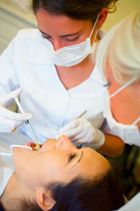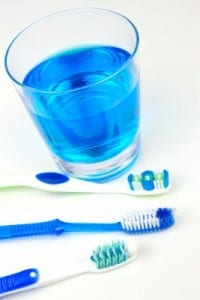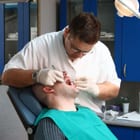 Teeth whitening kits are widely available at affordable prices many retail establishments in the United Kingdom. Many of these kits provide an excellent standard of teeth whitening, some even able to restore teeth to the widest shade that is possible. Read on to find out more about these kits and how they might be your ticket to a great looking smile.
Teeth whitening kits are widely available at affordable prices many retail establishments in the United Kingdom. Many of these kits provide an excellent standard of teeth whitening, some even able to restore teeth to the widest shade that is possible. Read on to find out more about these kits and how they might be your ticket to a great looking smile.
The key components of teeth whitening kits are the whitening gel and the bleaching trays. The whitening gel is specially formulated to contain substances which remove stains and bleach the teeth so that they are a healthy looking shade of white once the treatment is complete. They are used by applying the gel to the trays and wearing them on your teeth, usually at night but sometimes for short periods during the day.
These over the counter kits are convenient because you can undertake the treatment in your own time rather than having to make the time to visit the dental surgery. However the occasional drawback to the over the counter method is that they don’t always provide the most even coverage of whitening for your teeth. The trays cannot take account of the unique shape and contours of your own teeth and so they might not be able to apply the gel to all of the teeth to the same intensity.
Talking to your dentist in Leeds will give you all the facts to make up your mind about which teeth whitening treatment you want to choose if you are concerned about the look and shade of your teeth.





 It is well known that a number of herbs can be used for medicinal purposes in various cases. Leeds dentists are also now telling patients that some herbs can be useful in combatting gum disease. Far from being a trifling matter, and in no way of secondary importance behind dental decay, gum disease is a leading cause of tooth loss and can cause much pain and inconvenience.
It is well known that a number of herbs can be used for medicinal purposes in various cases. Leeds dentists are also now telling patients that some herbs can be useful in combatting gum disease. Far from being a trifling matter, and in no way of secondary importance behind dental decay, gum disease is a leading cause of tooth loss and can cause much pain and inconvenience. All of your body is linked together in one system and a problem in one part can affect the smooth running of other parts of the body. Dentists are keen to let their patients know this so that they can be aware of the added importance of maintaining their good oral health. Read on to find about some examples of the links between dental health and the general health of your body.
All of your body is linked together in one system and a problem in one part can affect the smooth running of other parts of the body. Dentists are keen to let their patients know this so that they can be aware of the added importance of maintaining their good oral health. Read on to find about some examples of the links between dental health and the general health of your body. If you are aware that you sometimes suffer from bad breath, it can be very difficult to cope with. Social occasions become that much more difficult if you know that every time you open your mouth to speak, breathe or smile you are giving off unpleasant smells. Dentists can help put an end to this problem as they are able to examine your mouth, find the cause of your bad breath and then advise about how you might deal with it.
If you are aware that you sometimes suffer from bad breath, it can be very difficult to cope with. Social occasions become that much more difficult if you know that every time you open your mouth to speak, breathe or smile you are giving off unpleasant smells. Dentists can help put an end to this problem as they are able to examine your mouth, find the cause of your bad breath and then advise about how you might deal with it. Super markets and pharmacies sell a wide variety of mouthwashes which advertise benefits to oral health. It is the claim if mouthwashes that they are good for stopping gum disease and freshening breath. If you are wondering about whether mouthwashes are effective when it comes to your oral health, you could do worse than ask your dentist in the Leeds area all about it.
Super markets and pharmacies sell a wide variety of mouthwashes which advertise benefits to oral health. It is the claim if mouthwashes that they are good for stopping gum disease and freshening breath. If you are wondering about whether mouthwashes are effective when it comes to your oral health, you could do worse than ask your dentist in the Leeds area all about it. An effective oral hygiene routine should encompass a number of different activities that ought to be undertaken on a daily basis. The result of this will be a set of teeth that look good, feel good and can carry out their key functions of facilitating eating, drinking and talking without problems such as cavities and gum disease. Unfortunately, some people believe that simply brushing their teeth is all they need to do to make sure their mouth is healthy.
An effective oral hygiene routine should encompass a number of different activities that ought to be undertaken on a daily basis. The result of this will be a set of teeth that look good, feel good and can carry out their key functions of facilitating eating, drinking and talking without problems such as cavities and gum disease. Unfortunately, some people believe that simply brushing their teeth is all they need to do to make sure their mouth is healthy. Brushing and flossing should form the bedrock of good oral hygiene but there is more to having good teeth than just this. Many of the other decisions that you take and the things that you do can have a bearing on the health of your teeth. Read on to find about what else you can do to ensure good oral health for many years to come.
Brushing and flossing should form the bedrock of good oral hygiene but there is more to having good teeth than just this. Many of the other decisions that you take and the things that you do can have a bearing on the health of your teeth. Read on to find about what else you can do to ensure good oral health for many years to come. Every tooth in your mouth is a hollow chamber that contains an amount of materials that are important to the health of the tooth. In certain circumstances this material can become compromised and treatment might be required to save the tooth. This is called pulpitis and dentists in central Leeds are experts at spotting the signs of the condition and dealing with it.
Every tooth in your mouth is a hollow chamber that contains an amount of materials that are important to the health of the tooth. In certain circumstances this material can become compromised and treatment might be required to save the tooth. This is called pulpitis and dentists in central Leeds are experts at spotting the signs of the condition and dealing with it. The way you look after your teeth and gums will have a major effect on your dental hygiene. Your dentist plays a part in this and keeping up the routine of having a check up every six months is absolutely critical, but the bottom line is that you should be taking good care of your teeth and gums at home, every day.
The way you look after your teeth and gums will have a major effect on your dental hygiene. Your dentist plays a part in this and keeping up the routine of having a check up every six months is absolutely critical, but the bottom line is that you should be taking good care of your teeth and gums at home, every day. Gum disease has fairly high rates of prevalence in the United Kingdom but dentists up and down the country are able to treat the symptoms or, even better, make sure that patients take care of their mouths in such a way that gum disease will not even occur in the first place. Read on to find out how gum disease can be avoided or treated.
Gum disease has fairly high rates of prevalence in the United Kingdom but dentists up and down the country are able to treat the symptoms or, even better, make sure that patients take care of their mouths in such a way that gum disease will not even occur in the first place. Read on to find out how gum disease can be avoided or treated.

